Focus on Climate Change and Poverty in Zimbabwe
We recently shared some photos that demonstrate the enormity and reality of a changing climate. One of the biggest areas to be impacted by climate change is sub-Saharan Africa. In the past few years, many countries and communities have experienced extreme drought, floods, and famine.
While this would be devastating to the livestock, crops, and people of any nation, the people in sub-Saharan Africa are even less able to cope with these overwhelming calamities. Unfortunately for poor subsistence farmers, damage done to the environment thousands of miles away is killing their chance at livelihood.
In Zimbabwe, to help combat the lack of resources, Development Aid from People to People Zimbabwe (DAPP-Z) is working with subsistence farmers in rural areas of Masvingo and Manicaland provinces to start a trend of sustainable, eco-friendly, and self-sufficient farming.
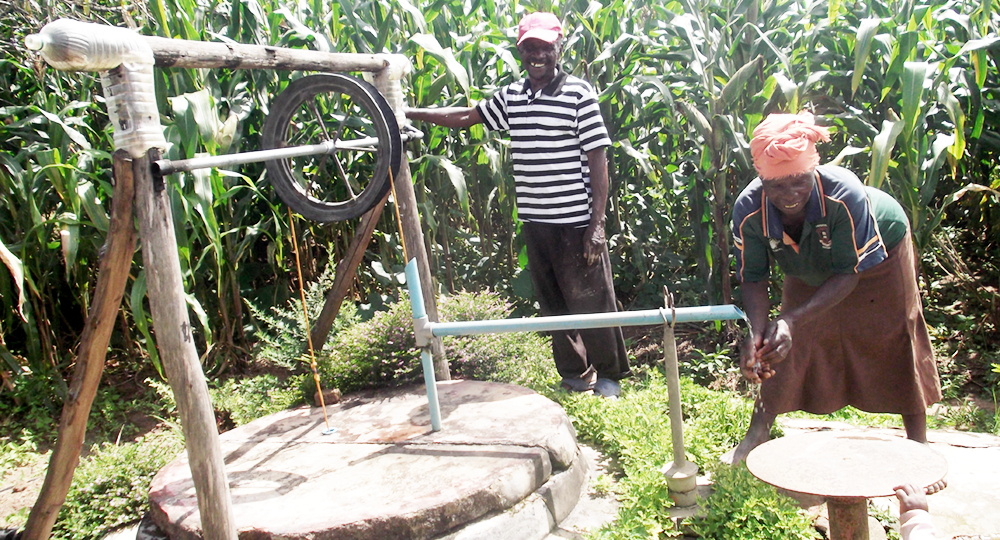
Project participants learn how to use a newly installed irrigation well and pump. These simple pumps were distributed in targeted areas of the Mutasa District.
Protecting the Environment, and the People
DAPP-Z, with funding provided by the United Nations Environment Programme, under the 10-Year Framework of Programmes (10YFP), is organizing farmers into cooperative groups known as "Farmers' Clubs," and providing them with training and mentoring in eco-friendly agricultural practices like agroforestry, crop rotation and diversification, and mulching and composting. It is also helping them understand how markets operate and what they can do to increase their earnings.
This project, Sustainable Lifestyles Among Rural Families in Zimbabwe: Small-scale Conservation Farming to Change Lifestyles in Africa and Beyond, is a two-year Sustainable Lifestyles and Education Programme. It was launched in February of 2017, and supports 2,000 farmers organized into 40 clubs.
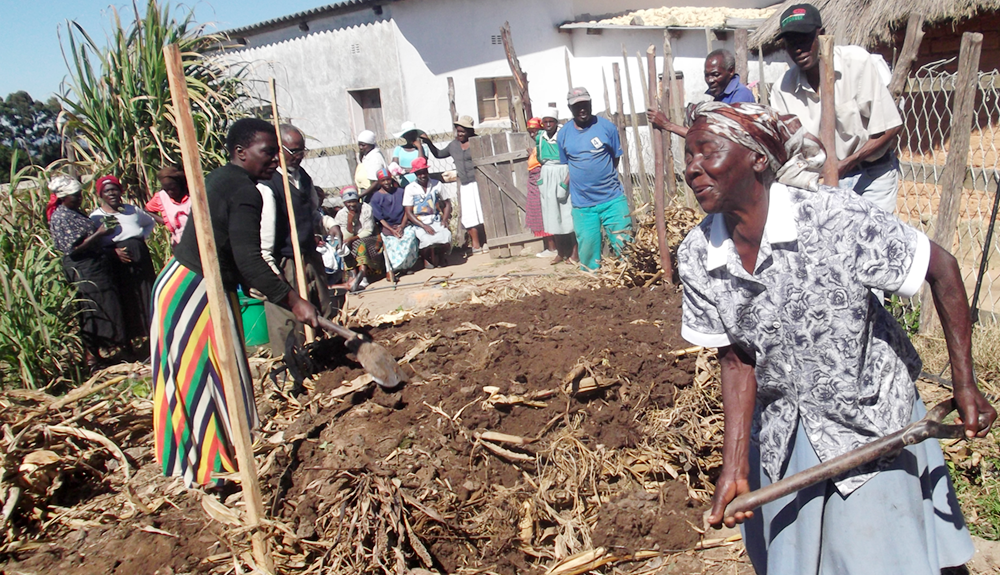
Farmers work to cultivate a shared compost site.
Market literacy
Market literacy is an important handhold in the climb from subsistence farming to income-generating farming - one goal of the project. Each district within the program has a committee that helps the farmers identify and connect with the surrounding market. The farmers who learn how to work within the market will know which crops are most in need and valuable at certain times, and will have an advantage over those without this knowledge. Market savvy is supplemented with technical knowledge about which crops are high-nutrient and will help to restore spent soil - another goal of the project.
Improving livelihood
The project aims to build momentum in Zimbabwe for eco-friendly agricultural practices that increase the fertility of the soil and combat environmental degradation. But, that's not the only benefit of DAPP-Z's Farmers' Clubs. The clubs also increase household food security and income, create new employment opportunities, improve diet, and reduce overall poverty.
To achieve this goal, the project is providing training in nutrition and health and financial and contractual management, as well as linking the farmers to already-established farmers' unions or associations. (Or, if a club wishes, by helping the club register itself with the appropriate governmental departments.) This allows the farmers to gain access to micro-credit loans and other beneficial services.
The farmers are becoming entrepreneurs and community developers, who are working to fix the environment and improving the livelihoods and living conditions of themselves, their families, and their countrymen.
Adding value through knowledge
The project also established smaller groups who were provided with and trained in the use of processing machines. These machines are used to create flours, oils, and butters. The purpose is to help farmers add value to raw crops and thus secure more income.
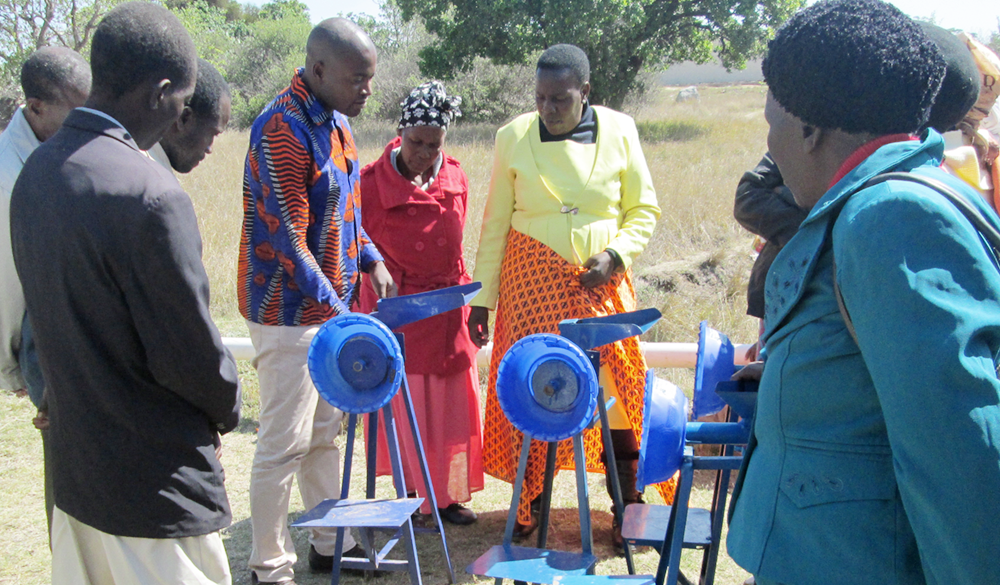
Project leaders demonstrate the use of a manual butter-making machine.
Influencing Society and Establishing Change
The farmers are seeing first-hand the benefit of protecting the environment through eco-agriculture on their land, and are now acting as change agents within the community. They are promoting public and environmental health through the establishment of handwashing stations and tree nurseries, and through the planting of gum trees, which increases soil fertility and nitrogen levels.
The program is impacting more than just the 2,000 farmers who are officially part of the project. By learning to work together and supporting each other, the Farmers' Clubs are establishing grounded solutions to problems in their communities. They are sharing their knowledge about the power of sustainability and conservation, and are creating long-term solutions for poverty reduction and mitigation of climate change.
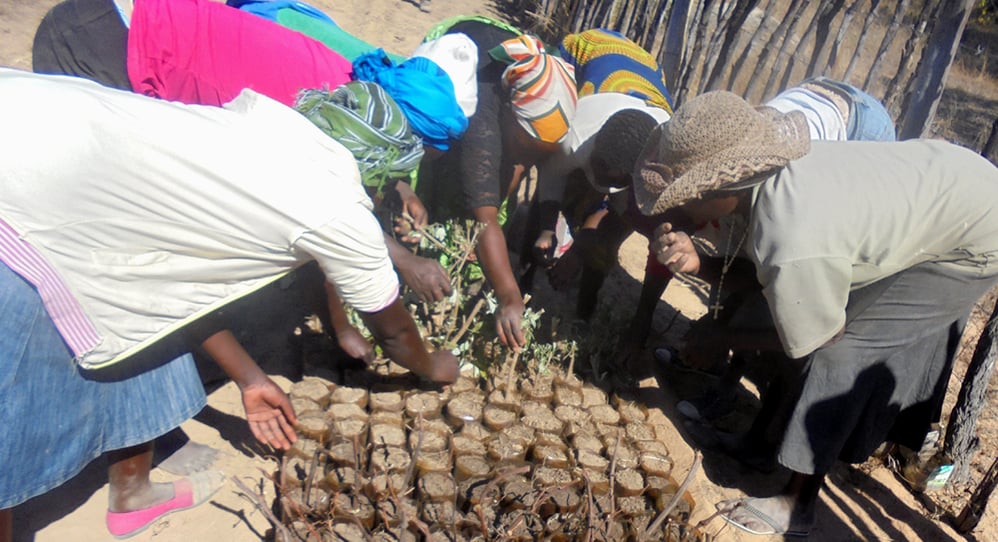
A Farmers' Club preps lemon trees for planting.
Empowering women
There is a larger number of women subsistence farmers in Zimbabwe than male farmers. To ensure that this ratio is supported by the program, about 60 percent of the Farmers' Club participants are women. As the men and women work together as equals, the project serves as a catalyst for women's empowerment. They, just as the men, become self-sufficient and societal role-models, impacting their families and their communities for the better.
Measuring the Impact
Along with standard monthly, and quarterly reports; project visits by organization and government leaders; and evaluation surveys; the project will measure its impact through the use of the Food and Agricultural Organization's Ex-Ante Carbon-balance Tool (EX-ACT). The EX-ACT will be used to estimate the impact of the project on greenhouse gases emitted and sequestered during project implementation.
The tool's purpose is to provide ex-ante estimates of the impact of agriculture and forestry development on greenhouse gas emissions and carbon levels. The EX-ACT is a land-based accounting system that measures carbon levels and changes. The use of this tool will allow for substantial and solid evidence of the environmental improvements generated throughout the project.
Planet Aid and Farmers' Clubs
Planet Aid has been a supporter of DAPP-Z, their Farmers' Clubs, and Farmers' Clubs in many other countries for a number of years. Click here to learn more about the Farmers' Clubs that we support!
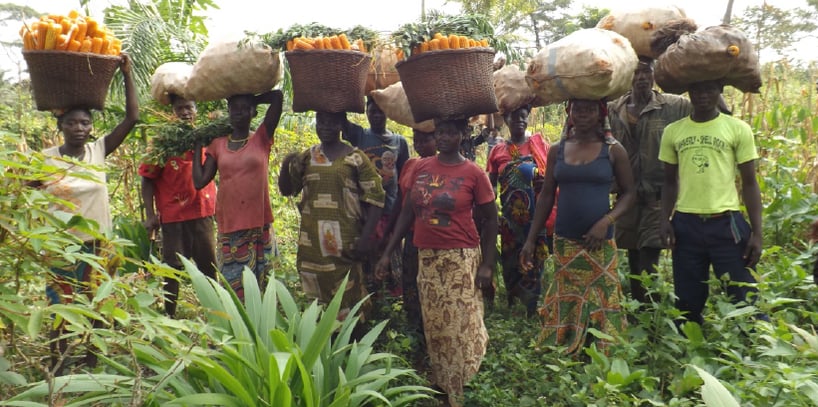
A Planet Aid-funded Farmers' Club in the Democratic Republic of the Congo show off their harvest.
